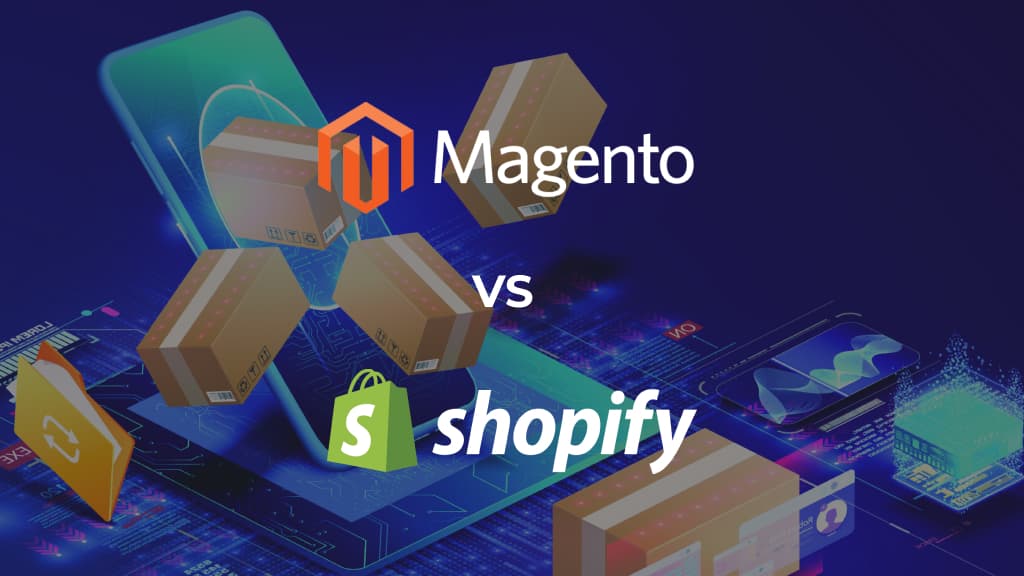In the world of online stores, there are two major players that dominate the market: Shopify Ecommerce and Magento Ecommerce .
Both platforms help you make and run online stores, but which one is better for your business?
In this article, we will compare Shopify and Magento to see which one is better for online businesses
.

The Rise of Ecommerce
Online shopping, known as ecommerce, is very important to us now. Many people use it for buying things they need. Global online sales are predicted to hit $7.5 trillion by 2027. This means that businesses have a big opportunity to make money in this industry.
Table of Contents
Today, consumers can browse a vast array of products from the comfort of their homes, with purchases delivered directly to their doorsteps. With the rise of ecommerce, the demand for reliable and user-friendly ecommerce platforms has also increased. Shopify and Magento ecommerce help businesses create and run successful online stores by giving them tools and resources.
Shopify Ecommerce : The All-in-One Solution

Shopify is a well-liked website for making and running online stores. This is a fully hosted solution. Shopify will take care of hosting, security, and maintenance for your online store.
One of the main advantages of Shopify ecommerce is its ease of use. The platform is easy to use with a simple interface. You can build a website by dragging and dropping items. Anyone can use it, no matter their technical skills.
It has many templates and themes to choose from. Businesses can make a professional online store without knowing how to code or design.
Shopify has tools to help businesses manage their online stores. Tools include inventory management, order tracking, and customer support. It works with many payment options and has a safe way to check out. Businesses can trust it for selling things on the internet.
Magento Ecommerce: The Open-Source Solution

Magento is a free (open source) online store platform that can be customized and adjusted to the needs of any business. Compared to Shopify, Magento is a self-hosted platform. Companies are in charge of their own hosting and security.
One big benefit of Magento is that it can easily handle growth without any problems. The platform has many features and options for businesses of any size and industry. It also has tools for online stores like managing inventory, tracking orders, and helping customers.
Another advantage of Magento is its extensive community of developers and users. This allows for a wide range of integrations and extensions to enhance the functionality of your online store. This means businesses may need to hire a developer to make changes and keep their Magento store running smoothly.
The Battle of the Ecommerce Platforms
Now let’s compare the features and abilities of Shopify and Magento ecommerce in the ecommerce debate.
Ease of Use
When it comes to ease of use, Shopify takes the lead. Its user-friendly interface and drag-and-drop website builder make it accessible to users of all technical levels. Magento needs technical knowledge and coding skills to customize and manage online stores.
Customization and Flexibility
Magento offers a higher level of customization and flexibility compared to Shopify ecommerce. With its open-source nature, businesses have more control over the design and functionality of their online store. This also means businesses might have to spend more time and money managing their Magento store.
Cost
Shopify offers a range of pricing plans, starting at $24 per month for its basic plan. This includes hosting, security, and maintenance, making it a more cost-effective option for businesses.
However, Magento has a free version that businesses can download to start an online store without spending money. But, businesses will have to pay for hosting, security, and maintenance to keep their online store running smoothly. It’s important for businesses to budget for these extra costs if they choose Magento for their online store.
Scalability
Both Shopify and Magento ecommerce offer scalability, but in different ways. Shopify’s all-in-one solution makes it easy for businesses to scale up their online store as their business grows. Magento is open-source so it can be customized easily. It works well for any size business.
Support and Resources
Shopify ecommerce offers 24/7 customer support through various channels, including live chat, email, and phone. It also offers a wide range of resources, including tutorials, webinars, and a community forum. You can get help from forums and user groups for Magento. Businesses might need to hire a developer for extra customization and features.
The Future of Ecommerce
In the future, Shopify and Magento ecommerce will still be important for online shopping. But as more people shop online and need ecommerce tools, which platform will be best in 2024?
The Rise of Digital Commerce
E-commerce, or online buying and selling, is becoming very popular. People can now shop and sell things on websites and apps. It’s easy and convenient, letting people buy things from home. This is changing how businesses work, making it easier to reach more customers all over the world.
Businesses, big and small, are taking advantage of this digital trend to grow and make more money in e-commerce. Businesses want to use social media more to reach customers in different ways and make shopping easier for them.
Shopify and Facebook are teaming up to help businesses sell products and services online. With this partnership, businesses can easily reach more customers through Facebook. This collaboration will give businesses a better way to connect with customers and make more sales.
It’s a big step forward in online retail. This integration makes it easier for businesses to reach customers and drive sales through social media.
You can add codes or plugins to your Magento website to link with Facebook (Meta). This lets you display your products on Facebook, similar to Shopify. Selling on Facebook can attract more customers and increase your visibility. It makes selling easier and helps you reach more people for marketing.
The Need for Ecommerce Solutions
Online shopping is growing quickly. Many businesses want to be online to reach customers worldwide. To sell things online, businesses need good e-commerce platforms.
These platforms help businesses grow and succeed. Platforms like Shopify and Magento help businesses create and manage online stores easily. They have many tools and features for this.
Shopify and Magento are well-liked online selling platforms used by many businesses worldwide. They have strong abilities and are easy to use. These platforms are important for any company looking to do well in the online market.
They have many features like custom designs, safe payment options, and can work with other business tools. Shopify and Magento ecommerce help businesses grow and change with the market. They are good for small or big businesses to manage their online shop and make sales.
Shopify is better than Magento because it has everything businesses need in one place. Users can easily create and customize their websites without needing technical skills. This is good for businesses that like things easy in an online store.
Shopify ecommerce is a good choice for businesses that want a quick and easy way to set up an online store. There are many different templates to choose from to make a store look professional without too much work. This is good for businesses that want things done fast and easy.
In conclusion, Shopify is a good option for businesses that want things simple and easy. It has everything in one place and is easy to use. With its tools and options, Shopify is a good choice for businesses to run their online stores efficiently.
The Winner of the Great Ecommerce Debate
When choosing between Shopify and Magento for your online store, it’s important to think about what your business needs. Both platforms have different features for different types of businesses. Shopify is user-friendly for businesses. Magento is better for businesses that want more customization.
Your choice will depend on your budget, technical skills, and what your business needs. Make sure to carefully compare both platforms to make the best choice for your business’s future goals.
Shopify and Magento are both good options for creating online stores. Shopify is easy to use and great for small to medium-sized businesses. Magento is more advanced and better for larger enterprises that need customization options. Both platforms have useful features, but the best choice depends on the needs of the business.
Small and medium-sized businesses can use Shopify to easily and affordably sell items on the internet. If you’re a large company with unique needs and can manage your own online platform, Magento could be a good option for you.
Conclusion
Shopify and Magento are both good options for businesses that want to sell things online. They are powerful tools in the ecommerce world. While Shopify ecommerce offers a more user-friendly and cost-effective option, Magento offers more customization and flexibility.
In the future, both online selling platforms will still be important for ecommerce. When picking between Shopify and Magento, make sure to choose the ecommerce platform that works best for your business needs and goals.
Who should choose Shopify over Magento?
Shopify is a great choice for beginners or businesses with smaller product catalogs. It's user-friendly with a drag-and-drop interface, affordable monthly plans, and a vast app store to extend functionalities.
Who should choose Magento over Shopify?
Magento is ideal for larger businesses with complex needs. It offers extensive customization options, scalability for high-volume traffic, and greater control over the user experience. However, Magento requires more technical expertise and has a steeper learning curve.
What are the biggest differences in pricing between Shopify and Magento?
Shopify offers tiered pricing with built-in hosting and transaction fees. Magento is open-source software, so you don't pay a licensing fee, but you'll need to pay for hosting, development, and potentially additional extensions.
How do SEO capabilities compare between Shopify and Magento?
Both platforms offer good SEO functionalities, but Magento provides more flexibility. You have finer control over meta descriptions, page titles, and URL structures. However, Shopify offers user-friendly SEO tools that are easier for beginners to manage.
What about security considerations for Shopify vs. Magento?
Shopify takes care of server security and PCI compliance for you. Magento requires self-hosting and ongoing security maintenance, which can be a bigger responsibility for the store owner.
